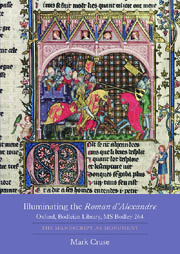 Illuminating the 'Roman d'Alexandre': Oxford, Bodleian Library, MS Bodley 264
Illuminating the 'Roman d'Alexandre': Oxford, Bodleian Library, MS Bodley 264 Book contents
- Frontmatter
- Contents
- List of Illustrations
- Acknowledgements
- Abbreviations
- Introduction
- 1 A Monument to Cortoisie
- 2 Urban Conquest and Spectacle
- 3 “Apraigne d'Alixandre”: Illuminating Exemplarity in Bodley 264
- 4 Alexander, Crusade, and the East in Bodley 264
- 5 The Production, Patronage, and Later Reception of Bodley 264
- Conclusion: Alexander in the Late Middle Ages
- Afterword: Mirror In Pixels
- Bibliography
- Index
- Already Published
4 - Alexander, Crusade, and the East in Bodley 264
Published online by Cambridge University Press: 05 February 2013
- Frontmatter
- Contents
- List of Illustrations
- Acknowledgements
- Abbreviations
- Introduction
- 1 A Monument to Cortoisie
- 2 Urban Conquest and Spectacle
- 3 “Apraigne d'Alixandre”: Illuminating Exemplarity in Bodley 264
- 4 Alexander, Crusade, and the East in Bodley 264
- 5 The Production, Patronage, and Later Reception of Bodley 264
- Conclusion: Alexander in the Late Middle Ages
- Afterword: Mirror In Pixels
- Bibliography
- Index
- Already Published
Summary
Among the many phenomena that influenced the creation of Bodley 264, the Crusades might appear to be one of the least relevant. Bodley 264 was completed more than fifty years after the fall of Acre in 1291, which marked the end of the most active period of the Crusades. During the 1330s and 1340s, when scribes were copying and artists illuminating the codex, France, Flanders, and England had begun their descent into the Hundred Years' War. The internecine and international conflict that afflicted these realms largely prevented them from mounting military expeditions to the Holy Land. Nevertheless, the dream of reconquest in the East continued to fire the imaginations of monarchs, nobles, and commoners until the end of the fifteenth century, even though such a project was never realized. The preceding centuries of crusade had left an indelible mark on the culture and collective memory of northwestern Europe, making the Holy Land a myth, a source of nostalgia, and a horizon inviting new dreams of empire and Christian conquest.
An ideal warrior endowed with a wide array of chivalric virtues, Alexander served as a touchstone affirming the antiquity of chivalry and the prestigious tradition to which all knights belonged. It is not surprising, of course, to see Alexander among a host of other figures from the Old Testament and antiquity who are medievalized heroes, endowed with exemplary chivalric, courtly, and kingly traits in medieval literature, historiography, and art.
- Type
- Chapter
- Information
- Illuminating the 'Roman d'Alexandre': Oxford, Bodleian Library, MS Bodley 264The Manuscript as Monument, pp. 145 - 180Publisher: Boydell & BrewerPrint publication year: 2011


